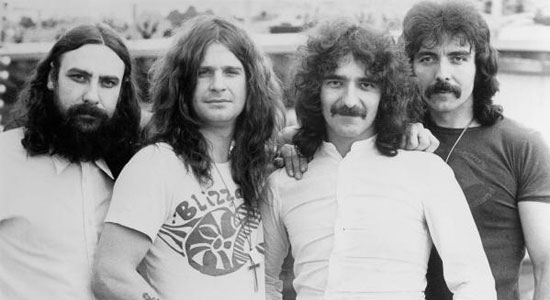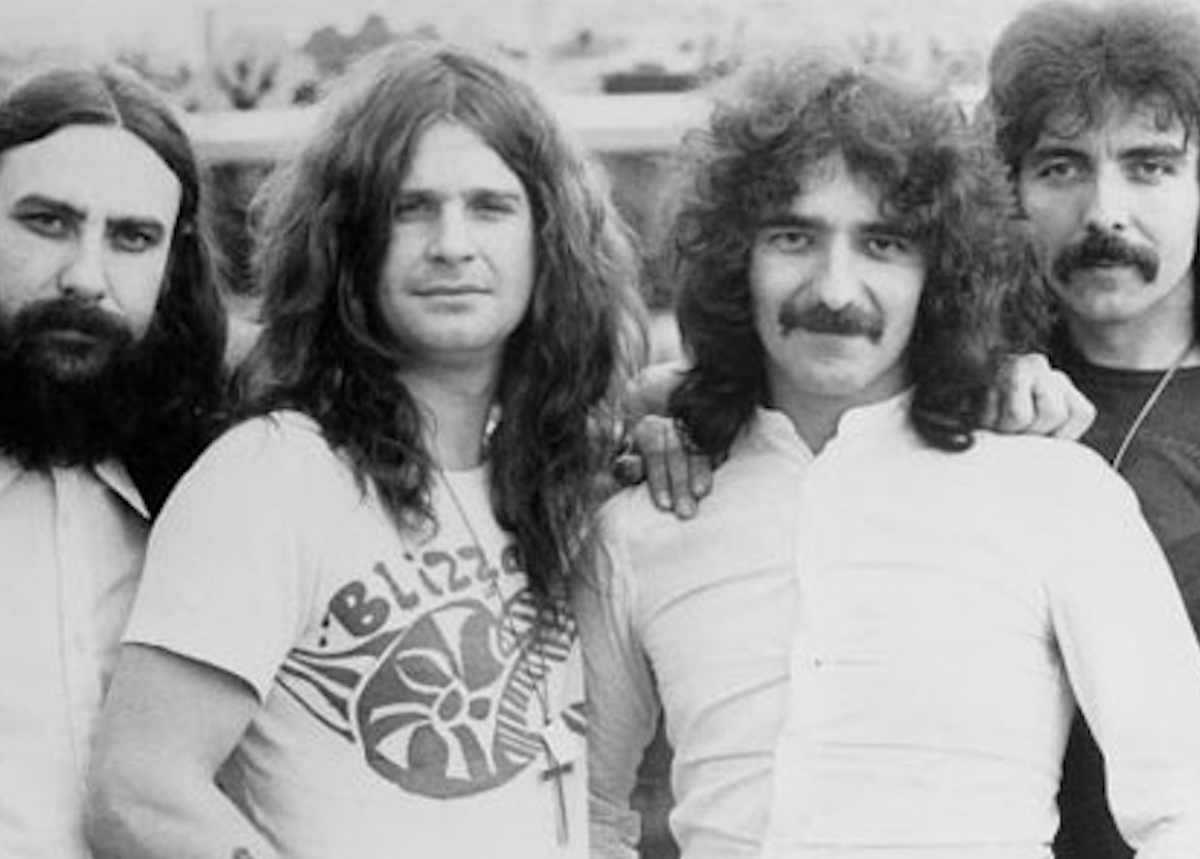Each week, we take a look at some obscure or overlooked entries in the catalogs of music’s big names. MAGNET’s Bryan Bierman focuses on an album that, for whatever reason, slipped through the cracks in favor of its more popular siblings. Whether it’s new to you or just needs a revisit, we’ll highlight the Hidden Gems that reveal the bigger picture of our favorite artists.

In November 2011, the four original members of Black Sabbath—Ozzy Osbourne, Tony Iommi, Geezer Butler and Bill Ward—announced plans for a reunion tour, along with a new studio album. It would be the first time the four regrouped since the late-‘90s (with two previous one-off performances before it: Ozzy’s “retirement” concert in ’92 and 1985’s Live Aid.) However, the proposed reunion hit two significant stumbling blocks in 2012. Firstly, drummer Ward could not agree on what he called a “signable contract” that “reflects some dignity and respect toward [him] as an original member of the band.” Ward was originally a part of the reunited Ronnie James Dio lineup of Sabbath—renamed Heaven & Hell—but left that project in 2006, citing musical differences. Also in 2012, guitarist Iommi was diagnosed with lymphoma, which halted preparations for the album and concerts, though they plan to continue eventually. (While Iommi is recovering, Osbourne will tour with various musicians, including Butler at several shows, as “Ozzy And Friends.”)
With all these setbacks, one might wonder if it’s worth it. To be frank, 1998’s Reunion live album was solid at best, and old age is historically unkind to most bands, as it has been to Ozzy’s voice. (Sorry, but it’s true.) Black Sabbath has had a notorious amount of lineup changes, quittings, firings, health problems, drug problems and even deaths, with Dio’s passing in 2010 to stomach cancer. So, although none of this drama is anything new, is it really worth it? Can the band create something that will be nearly half as good as it once was? The odds are certainly stacked against ’em, but keep in mind that they’ve done it before, particularly with the Ozzy lineup’s final album in 1978. If anything, the group’s resilience is commendable, and like the name of that last record, it appears that Black Sabbath will—here it comes—Never Say Die! (Apologies all around.)
After 1976’s mediocre Technical Ecstasy and its ensuing tour, Sabbath began work on its next album in the fall of ‘77. Although the band was in the throes of personal and creative tension, the songwriting sessions pressed on until that November, when Osbourne announced he was leaving the group. Ozzy was in very poor shape at the time, grieving over the recent death of his father, while his drug and alcohol problems hit a new high. His plan was to start a solo career, with a new backing band entitled the Blizzard Of Ozz. (Although it didn’t pan out, he would later use the name for the title of 1980 classic solo debut.) With studio time in Toronto already booked, the three remaining members decided to keep the band going after Ozzy’s departure, beginning their search for a new lead singer. Iommi rang up an old acquaintance from his hometown of Birmingham named Dave Walker. Formerly of blues-rock band Savoy Brown and briefly the leader singer for Fleetwood Mac, Walker accepted the invitation. A few songs were written and the band was ready, even appearing on BBC television to perform its classic “War Pigs” and a new song that would become “Junior’s Eyes.”
A few weeks later, Osbourne had changed his mind and informed Ward that he’d like to come back to the band. With Ozzy wanting to return and Sabbath unsatisfied with the new lineup (it’s obvious Walker’s voice didn’t fit), the band agreed to have its old singer back. With the recording dates rapidly approaching, the whole band traveled to Wales to begin writing songs, yet again. Quickly, the same old tensions began to flare up when Osbourne refused to sing any of the material written with Walker, regardless that it was all the band had. Eventually, the song that the Walker-led Sabbath premiered on TV was kept, for the most part, though Butler and Ozzy changed the lyrics to revolve around the death of the latter’s father. With limited material, Black Sabbath headed to the cold winds of Toronto to begin recording the new album, as well as writing it.
In his autobiography, Iron Man: My Journey Through Heaven and Hell With Black Sabbath, Iommi explained, “We worked [there] from nine o’clock in the morning in the freezing cold, because the place hardly had any heating, and then at night we went to the studio to record. It was just totally wrong for us. Up to that point we’d write something and then live with it for a bit, giving the songs time to grow … In Toronto we never had that luxury. That’s why to me Never Say Die! is very much off the wall.” Drug use was rampant, though that was certainly nothing new for Sabbath. Each member had various personal problems at the time, which didn’t help the overall mood. Osbourne became increasingly upset with Iommi for forcing him to do take after take of vocals, which he felt was revenge for leaving the band in the first place; by the end of recording, the two were barely speaking to each other.
Given the dire circumstances, the opening title track shouldn’t be as great and upbeat as it is, proving that even through all the bullshit they had to deal with, when it came to making rock ‘n’ roll, Black Sabbath could still excel. Though cheerily optimistic, the song stands up as one of the band’s best, with Ward and Butler’s giant rhythm section still weighing a ton. Although it didn’t sell too well as a single, the song has become a fan favorite, and along with “A Hard Road,” is one of album’s only two songs to appear on best-of compilation Symptom Of The Universe.
Never Say Die! didn’t just coast along the group’s past; the band pushed its signature sound further out. Though they had previously experimented with synthesizers on Sabotage’s “Am I Going Insane (Radio)” and Technical Ecstasy, “Johnny Blade” features them more prominently than ever. With a warped electronic intro, followed by some breakneck snare work by Ward, the song details the life of Johnny Blade, a knife-wielding maniac who lives on the streets. According to Butler, the song was inspired by Ward’s brother, who used to run with a violent gang as a teenager. Halfway through, the song slows down, drops all the synths and adds the classic chug that they’re famous for.
Besides “Johnny Blade,” several songs on the album push the band in new directions and flirt with new sounds. “Air Dance,” the LP’s zenith, begins with Iommi’s nasty guitar harmonies, followed by mellow acoustic guitar and piano. (Never Say Die!’s keyboards are mostly played by session man Don Airey, who would ironically join Rainbow the next year, when their its singer, Ronnie James Dio, would leave to join Sabbath.) There’s an epic, almost prog-rock level of intricate pieces that make up “Air Dance,” including an off-time jazzy breakdown. The record’s unsung hero is most definitely Ward, just like Butler had been for so many of Sabbath’s works. Alternatingly, Ward plays as hard and soft as he ever had on wax before, from pounding tribal beats to subtle cymbal flourishes that adds to the songs, no matter what style they’re in.
The heavy, horn-filled “Breakout” is the most radical track in the set, an instrumental that provides a backdrop for the brass work. Several tracks feature horn sections, including the Ward-sung “Swinging The Chain,” but none are as interesting as this. “Breakout” sounds reminiscent of free-jazz guitarist Sonny Sharrock’s 1991 album Ask The Ages at certain points, something I’d never thought I would say about Black Sabbath. It’s a shame the band didn’t follow up on this sound with its later releases, considering that mixing heavy metal and jazz was pretty groundbreaking for the time. The exploration of new sounds is part of the reason why Never Say Die! is looked down upon by many fans. For a band that not only was well known for playing heavy metal, but creating it, it must have surely been a shock to some listeners. But that’s what all great artists do—they move forward. If Ozzy and Co. set out to only make one type of music, they would have stopped with the first song on their first album, “Black Sabbath,” which is still to this day, the most perfect example of metal in existence. But lucky for us, they didn’t stop and went on to become one of the greatest rock bands of all time.
Until it ended. Even with a tour in ’78, the band’s future was practically written on the wall. The opening band for the shows was a young group called Van Halen, who had all the energy that Black Sabbath now lacked. Many concertgoers felt that this new band blew Sabbath out of the water. After the tour wrapped, followed by some unproductive studio sessions, the band decided to fire Ozzy. The personal and creative struggles had only gotten worse in the past year, as did Ozzy’s drug dependence, which severely combated his work ethic. Osbourne was hurt by the move, but went on to an extremely successful solo career; Black Sabbath continued on with newly recruited singer Dio and changed its musical style yet again. Never Say Die! turned out to be the original lineup’s last studio album, and although it’s not its greatest collection, it’s a severely underrated work by a band that still had plenty of ideas and experiments in the tank. Let’s hope they’re reunion can be as intriguing.








2 replies on “Hidden Gems: Black Sabbath’s “Never Say Die!””
I thought never say die was A good album..it was out of context for sabbath..the heavy metal gods at the time..but giving it a listen over the years one comes to the conclusion that it was a much better album then anyone thought at the time…Compare it to the best album they EVER put out..that being Volume 4 and id say it comes in 2nd..to bad they didnt follow it up until 2013.
I think it is a great album as well. Throw it on crank it up just say fuck it. Thats what Sabbath means to me. They have the ability for me to just get sucked right in, it all just fits together perfect. And this album does it to. Gezzers insane, Wards drumming is incredible you know Iommi is gonna bring it. Im glad this isnt mainstream so it doesnt get beat to death like paranoid. Sabotage is my favorite though